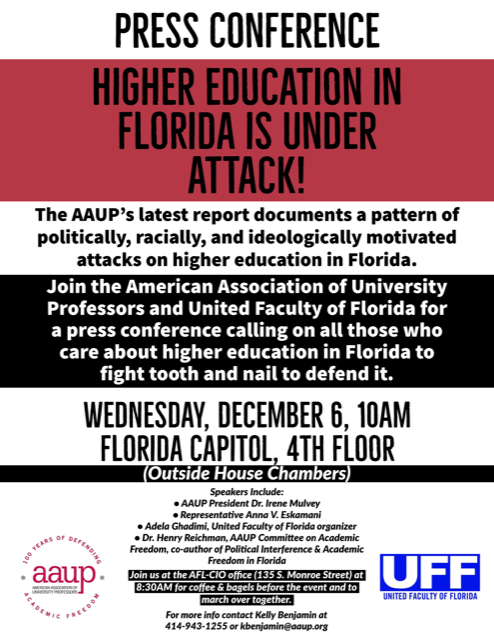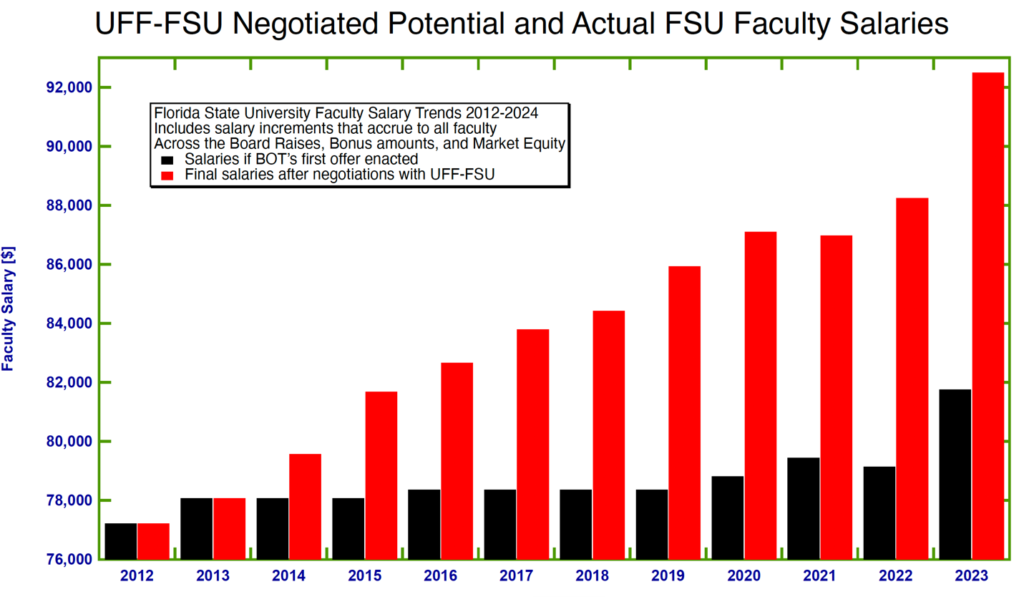The Board of Trustees (BOT) and UFF faculty (UFF) bargaining teams met Wednesday (12/6) to continue their negotiations on Post-Tenure Review (PTR).
Major differences still exist around some issues, including, most importantly: 1) the UFF believes that discipline should be implemented at the time of the offense and be done, so a faculty member should only be punished for that offense once; the BOT thinks past discipline should be reconsidered along with faculty members’ five-year performance review, perhaps leading to different results; 2) the UFF believes that the rating of “Unsatisfactory” should not be included because it leads to termination and therefore upends tenure at FSU; 3) the UFF believes that faculty members should not be surprised by the outcomes of these reviews, while the BOT team wants to let the chair arbitrarily decide (perhaps differentially for different faculty members) what evidentiary materials should be considered.
Though this is a tough road, we believe that if we weren’t working to defend your rights as faculty, nobody else would. The administration has advised us to stay the course and that nobody will be fired for what they teach. Nevertheless, the administration has not said it would defend individual faculty members in the face of complaints, mob protests, or political attacks – only the union has.
The session started with a new proposal from UFF designed to make the PTR more faculty friendly. A summary of our new offer is presented here:
- We included “calendar” year in the definition of Review Period — 5 calendar years. We believe that faculty deserve to have no ambiguity about the Review Period.
- We excluded the department chairs from the definition of Administrative Role to let chairs be eligible for a PTR-based monetary raise. If a chair does not want to go up for review, they can apply for a postponement.
- We reinserted that the evidence of performance must include the past 5 years of annual review along with Assignments of Responsibilities, which the BOT team had taken out at our prior meeting. We wanted to ensure that faculty would not be surprised at their ratings, whereas the BOT team had erased any guardrails to what would be considered, making the selection of materials arbitrary.
- For the evidence of “unsatisfactory” rating, which in the BOT’s version results in firing faculty, we added “evidence of gross incompetence” and referred to the Discipline Article (Article 16), which specifies procedures for progressive discipline.
- Past disciplinary offenses and actions would not be considered (no double jeopardy). This remains one of the subjects of disagreement between the two teams.
- We added that the Provost’s notification to faculty of the rating, justification, and outcomes of their review shall be in writing.
- We added back the language on the consistency of the PTR ratings with the past five years’ annual evaluations.
- Ratings of Exceeds Expectations or Meets Expectations would result in a 12% raise. We believe that the faculty deserve to know what monetary reward is awaiting them.
- In the outcome for “Does not meet expectations”, we included a reference to the CBA, which lays out a process for implementing a Performance Improvement Plan (PIP).
- We included the same appeal process as in our previous offer, which includes an outside arbitrator for represented faculty if permitted by law.
After a caucus, the BOT team offered a counter-proposal including the following:
- They struck down the calendar year from the definition of PTR period. However, they added start and end dates for the PTR material, e.g., SPCI reports from Fall 2018 to Summer 2023.
- Chairs would be exempt from the PTR process and any associated monetary reward. However, they added language that chairs shall be reviewed annually per BOG regulations in a still unspecified process.
- Monetary rewards would be left unspecified. However, they added language
- saying that the amounts shall be negotiated in the next regular bargaining reopener as well as whether the reward will be a bonus or an increase to base.
- They accepted the addition of a new section, “Criteria for determining performance rating scale”. However, they replaced “Evidence” with “Examples of evidence” and “shall” with “may”, e.g., “Examples of evidence to support the rating may include…” replaced our “Evidence to support the rating shall include…” This leaves the chair’s decision of what to include and exclude for consideration in their review utterly arbitrary.
- The BOT team stuck down the “gross incompetence” in the “unsatisfactory” rating and added back their language, which includes “disregard or failure to follow previous advice”.
- Chairs and equivalent would consider annual evaluations and past disciplinary offenses in their letters assessing performance.
- The reference to the CBA on Performance Improvement Plan (PIP) is removed because this reference is for specialized faculty and PTR is for tenured faculty.
- A rating of “Unsatisfactory” would result in a Provost recommendation of termination. We believe this changes tenure and conflicts with the contract’s definition of tenure as permanent employment except when it comes to resignation, retirement, layoff, or dismissal for just cause.
The next round of negotiations is not scheduled yet and is expected to happen in January.
In the meantime, if you are not already a UFF member in good standing (paying dues via eDues or a check), we hope you’ll join or rejoin our faculty union and help protect the very existence of our contract. If we don’t reach 60% membership density, we simply won’t have a contract to defend and we won’t be able to bargain with the administration over post-tenure review, raises, or anything else. Please join now. It only takes a minute. Here’s the link: https://uff-fsu.org/get-involved/join/
Arash Fahim, UFF-FSU Bargaining Team Member, on behalf of
Scott Hannahs, Specialized Faculty, and Jennifer Proffitt, Professor, Bargaining Team Co-Chairs




